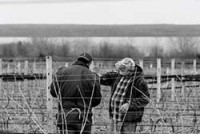Ag Supervisory Leadership Certificate Program: Managing Performance
Event Details
Date
November 10, 2021
Time
Asynchronous Online Class
Location
Online Class and Zoom Meetings
Cost
Registration : $275.00
Host
Cornell Ag Workforce Development
Rachel McCarthy
email Rachel McCarthy
Event Registration

Supervisors are critical to the success of farm businesses. They have a major impact both on employees' daily work experiences and on the production performance of the business. The Agricultural Supervisory Leadership certificate helps farm supervisors and managers learn and apply human resource management practices and leadership skills that foster rewarding workplaces and drive business results. Confident managers who thoughtfully apply leadership and management skills improve employee performance, develop teams, reduce employee turnover, and increase employee engagement. The courses within the certificate program will offer extensive practice and engagement activities to build confidence and skill sets.
This course, Managing Performance, will help farm managers learn to harness the power of performance feedback and coaching. In this class we will cover building clear and effective workplace communications, setting safety expectations and conducting effective performance improvements. Materials will release November 10, 2021 and live weekly Zoom discussions will be held from 3 to 4 PM EDT each Tuesday from November 16 through December 21. Participation in the live sessions is highly encouraged and provides a valued opportunity for peer to peer learning and networking.
More Information
Each course includes up to six weeks of instruction on topics that will build your leadership and management skills. Instruction includes a combination of prerecorded lectures, reading assignments, written exercises, live discussion sessions and quizzes. For those looking to learn more on a particular topic, supplemental videos and articles may be recommended by the instructor. To get the most out of the course, students should plan to spend two to four hours each week on combined course activities.
Courses in the Agricultural Supervisory Leadership certificate include:
- Transitioning to Supervisor: Develop essential communication skills and manage conflict. Lead a multi-cultural team. Build an effective workplace culture.
- Organizing Work for High Quality Results: Develop clear expectations and standard operating procedures. Delegate effectively. Diagnose and correct performance problems.
- Managing Performance: Understand motivation. Harness the power of performance feedback and coaching. Build clear and effective workplace communications. Set safety expectations. Conduct effective performance improvements.
- Ethics and Employment Regulations for Supervisors: Implement responsible and ethical labor practices and understand why this matters for agriculture. Recognize and prevent sexual harassment. Understand and follow minimum wage and overtime laws. Implement Equal Employment Opportunity laws to prevent discrimination and harassment. Use an employee handbook. Handle employee discipline and termination.
- Becoming an Effective Trainer: Identify training needs. Understand learning styles. Design and plan learning experiences that accommodate learner needs. Develop effective training skills and techniques. Evaluate learning results and training effectiveness.
- Staffing and Organizing Your Team: Develop job descriptions. Learn how to find potential employees, interview, and select the right people. Implement new hire documentation, employment authorization, and onboarding: bringing new employees into the business successfully and productively.
For questions, contact Rachel McCarthy, Supervisory Leadership Certificate Program Coordinator, at rachel.mccarthy@cornell.edu.

Upcoming Events
2026 Northeast Extension Fruit Consortium Winter Webinar Series
February 4, 2026 : Management of Up and Coming Strawberry Diseases in the Northeastern United States
Session 1: Management of Up and Coming Strawberry Diseases in the Northeastern United States
February 11, 2026 : Kiwiberry Production in the Northeast
Session 2: Kiwiberry Production in the Northeast
February 18, 2026 : Heat Mitigation- Sunburn and Fruit Coloring
Session 3: Heat Mitigation- Sunburn and Fruit Coloring
February 25, 2026 : The Dating Game- Updates in Lepidopteran Mating Disruption
Session 4: The Dating Game- Updates in Lepidopteran Mating Disruption
March 4, 2026 : USEPA Endangered Species Act Strategies and Pesticide Use
Session 5: USEPA Endangered Species Act Strategies and Pesticide Use
March 11, 2026 : Practical Drought Management for Fruit Growers
Session 6: Practical Drought Management for Fruit Growers
Managing the Invasive Swede Midge Webinar
March 6, 2026 : Managing the Invasive Swede Midge Webinar
Swede midge is an invasive fly that causes serious economic losses to brassica crops. Due to its small size and hidden feeding habits, swede midge is often called an "invisible pest" and damage may be misdiagnosed. In this webinar, we will review the swede midge life cycle and crop damage symptoms, current management recommendations, new research findings, and highlights from on-farm case studies with a focus on organic management.
New Farm Manager Skills Day - Get the Tools You Need to Grow Your People (Hudson Valley)
March 10, 2026 : New Farm Manager Skills Day - Get the Tools You Need to Grow Your People
Millbrook, NY
Are you moving into a supervisory farm management role this season and want to get off to a good start? Are you an experienced manager who wants to connect with other "people" managers and work on your skills? This one-day workshop is for you!












































